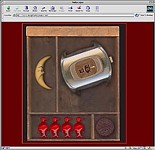Dangerous Music
By Kim Mellen, Fri., Jan. 29, 1999
|
|
This is very punk. The five members of Austin's Knife in the Water, decidedly not a punk band, are gathered at the Sixth Street entrance to Emo's, separated from Saturday night passersby only by metal security bars. Seating is scarce; everyone is speaking from a different level -- a cinder block, mismatched barstools, a dirty, hot-pink plastic office chair. Vocalist/organist Laura Krause, who decides to just stand, shuts the door to block out some of the noise from whatever screaming power tool is currently being used in remodeling the club's lower stage. Knife in the Water is fixing to open for Lullaby for the Working Class and Edith Frost on the club's upper stage, and the band members are giddy, joking and finishing each other's sentences like an old married couple. In this light, then, it's ironic that Knife of the Water was originally supposed to be a one-night stand.
In the summer of 1997, Aaron Blount, vocalist, guitarist, and songwriter, plus Krause, pedal steel player Bill McCullough, and bassist John Brewington, started the Flaxfield Unheard Music Festival, an outdoor event in Blount's hometown of Lytton Springs, a small town near Lockhart which their drummer, Cisco Ryder, describes as "a young, burgeoning Waco."
"Flaxfield was our idea for a cult," jokes Krause.
"And we will rise again," threatens Ryder in his best drawl.
They built a stage and booked local bands, among them the Hamicks, ... Trail of Dead, SisteRuNaked, Stretford, and the Wannabes. Just so they could be part of the lineup, they threw together Knife in the Water, taking the name from Roman Polanski's 1962 Polish-language psychosexual sailing drama. They managed to hold the audience's attention during their 5am slot, and after that, their plans to go their separate ways were abandoned.
"I know everybody in the band immediately liked the songs," says McCullough, himself a songwriter. "I know I did. It just seemed different for me from other bands. When you try to paint a picture, and you bring five different painters together to work on one picture and agree on certain things, it's a pretty complicated thing. But in this band, there's a lot of mutual dependency, and people are mature enough to realize that. It really is, in a romantic sense, a band."
Knife in the Water's music has the half-dreaming feel of pre-dawn, but their sound is charged with the second wind that carries you through to the sunrise. Now 5am, long into a post-show gathering in the living room of the Cherrywood duplex he shares with Krause, Blount is standing, head bowed, listening quietly to Washington Phillips, one of the founding fathers of American gospel music and master of the rarely played dolceola, a zither-like instrument with a small keyboard that allows a melody to be played over a chordal rhythm. Turning to a friend, he ventures that listening to Phillips' haunting sound is enough to make one believe in God.
"There's something about everything he's doing that's so perfect," says Blount. "The essence of humanity. That music doesn't give me a feeling of futility. The blues doesn't either. ... It's all music that's uplifting."
Titled "I Had a Good Mother and Father," the Phillips composition has also been covered by lo-fi kings the Palace Brothers, to which the locals in Knife in the Water garner comparison. While this is somewhat apt, and it could be said that Blount's guitar playing is Bedheadish and his voice that of a Fifties teen crooner on Codeine -- Krause's dusky harmonies recalling Low -- that only sets you vaguely in their ballpark. Let's not forget the group's fondness for covering Lee Hazelwood/Nancy Sinatra songs. Perhaps more abstract descriptions get at the heart of the group's appeal. Krause, a minister's daughter who grew up on church and classical music and has been playing piano since the age of five, quotes her father's reaction to Knife in the Water's music.
"It makes him feel like he's a kid who wants to go out in the yard and eat worms," she laughs.
Blount describes the band as "modern teenage gospel," despite the fact that they're neither teenagers nor churchgoers. "I like to think we make teenage music, even though we're all well beyond that age," he says.
All in their latter 20s except for McCullough, the self-described "old guy" of the group who clocks in at 35, Knife in the Water does make teenage music -- with a gospel influence.
"Gospel doesn't have to be religious," Brewington is quick to add. "You know that. Make a joyous noise."
|
|
"My influences are Buddy Emmons, Jimmy Day, and Lloyd Green," says McCullough, noting that the legendary Day, who passed away last weekend (see sidebar), was his friend and teacher. "They all have a style of playing, using fills and harmonies that support and back up the vocals, these beautiful runs and passages. I feel lucky because I'm doing this in a completely new setting, and it still seems to work. That amazes me."
"Country is dangerous music," Blount asserts. "Blues and country are dangerous because they sit on this existential point. For that music to work, for that kind of music to be convincing and sincere, it really has to feel death; you have to feel the death that person is singing about, whether it's implied or actually in the lyrics of the song. It's all about dying and sex."
"And drinkin' and killin'," Brewington whoops.
Blount and Brewington joke about alt-country bands being the Eagles of the Nineties. They allow that "alt-country" is a somewhat artificial genre, that there's a lot of great music in the pages of No Depression, but even then, the two musicians sense there's something watered-down about alt-country -- that the evocative power of the country music of our grandparents' generation can't be matched by simulation. It's probably impossible to effectively re-create that music out of its context -- the world of the Depression, the coal miner's life, the pre-Civil Rights era -- and perhaps more profoundly, the belief in God and the fear of hell from which the most powerful music in the world has sprung, including the blues, country, and even early rock & roll that Blount and his band so revere.
This generation is, after all, the first generation to be brought up godlessly to a great and unprecedented extent, something Douglas Coupland, who coined the label "Generation X," a label even more hackneyed than "alt-country," pontificated about in his novel Life After God. Knife in the Water knows that to create profound music after God requires being driven by emotions central to the human experience. Among the biggies -- death, loss, love, sex -- society as a whole may have lost faith in God, but the longing for God remains.
"One of the things I like about the older country music is that it creates a lot of emotion and soul for me," McCullough says. "I think Aaron is very successful in creating that in his music and the stories he tells with his lyrics. But it's his own way; he's not recycling."
Although they didn't hold the Flaxfield Unheard festival again last year, the members of Knife in the Water are planning on it for this summer. Blount, laughing, says that the money the group would have spent on a Flaxfield '98 festival was "selfishly used to put out our own album," but they all agree that recording and self-releasing their debut last fall, Plays One Sound and Others, was the right choice. Recorded partly at Austin's Sweatbox Studios and partly at McCullough's house, Plays One Sound and Others has done well in the local market, considering the band's low-key promotion efforts. Their decision to self-release the album was imbued with a determination that, in a town rife with label horrors, other bands would do well to follow.
"What I liked about doing it ourselves," says drummer Ryder, "is that the focus is so much more intent on getting it right, versus having to be under the gun."
Ryder, who comes from a family of musicians -- his mother is Eliza Gilkyson, his uncle Tony Gilkyson played with X, and his grandfather Terry Gilkyson wrote soundtrack music for The Jungle Book -- would probably know. Nevertheless, he and his bandmates say they're not anti-label.
"Self-releasing wasn't necessarily a choice," Krause admits. "There's a lot of work. Not that it isn't worth it. But it's not all happy, yaya, roses. When you do have a label, you have people who take care of the bullshit."
"You can sit back and do drugs and let the money roll in," says Blount, scoffing. "Like I've ever seen that happen."
"If we had had a major label come to us, saying, 'Here's a bunch of money, put out your record,' it might have been a different story," Brewington adds. "But no one was going to come to us and put it out, and we wanted to get something out. If people come to us, that's great, but otherwise, it doesn't change anything we're doing. We don't sit and wait, there's no point in that. I mean, how many bands in Austin have been fucked doing that?"
Brewington says they plan to follow the advice of Elvis Costello: You have all your life to make your first album, and seven months after that to make the next. After they're done with a single now in the works, they'll spend the next four to five months laying down another record. They agree that in Austin, where so many acts get dropped from labels, they're lucky to have the luxury to put out a second album. They've seen some of their peers become jaded and disillusioned by going through the label wringer.
"It would just exhaust you," says Blount. "It would make music seem futile. Which is sad."










